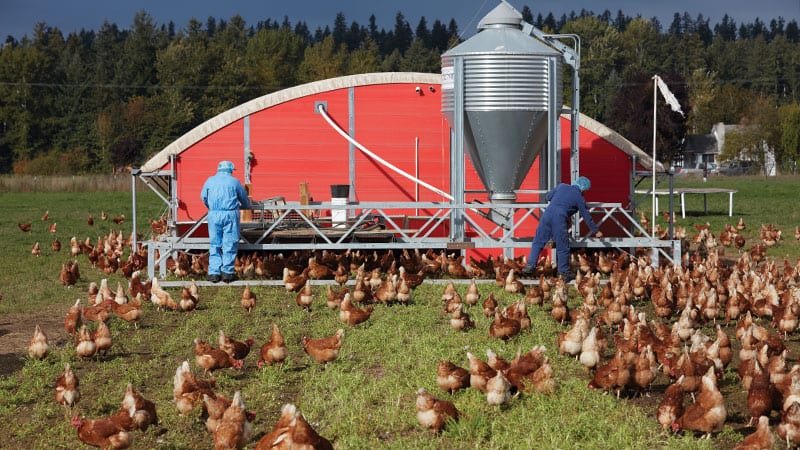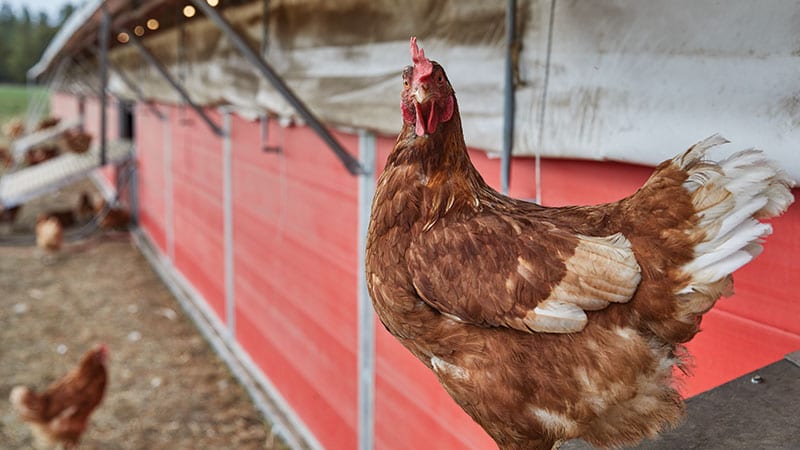PCC sets a new standard for sustainable eggs
By Rebecca Robinson
This article was originally published in March 2020

Cage-free has left the barn. The future of animal welfare and sustainable egg production lives outdoors.
After a decade of behind-the-scenes work, PCC has officially adopted a new standard for our fresh chicken eggs, requiring that our suppliers’ hens all have access to the outdoors. All eggs on PCC shelves now meet that minimum requirement.
This is a substantial step up from our previous standard, which required that all eggs carried by PCC be “cage-free.” Cage-free hens do have better living conditions than the cramped cages still used by the majority of egg suppliers in the U.S., but they might never leave an enclosed facility or see the sky. PCC felt we could do better for the animals and for our members.
“For me, everything hinges on animal treatment,” said Scott Owen, PCC’s senior grocery merchandiser. “Once you see how bad it can be, it makes you think about it: What is our part in bringing standards up?”
PCC is one of just two major grocery chains to achieve this higher standard of outdoor access for all hens (the other is Natural Grocers, based in Colorado). The longtime goal required years of working with farmers to ensure an adequate, reliable and affordable supply at our stores.
The first challenge was just developing a definition for our baseline requirement of outdoor access for hens, also known as “free-range.” The term “free-range” can be interpreted widely, as is the case with many other unregulated labels, and doesn’t have a legal meaning.
To develop our definition, we researched how the terms “cage-free,” “free-range,” and “pastured” are described by various groups including Consumer Reports, the National Organic Program, the U.S. Department of Agriculture, Animal Welfare Approved label and Certified Humane. There is some variation in even the stronger animal welfare standards on what a reasonable amount of space is for a chicken. Chickens, after all, will stray only so far from their food, water and shelter. PCC’s preference is that the hens have access to pasture and not just an uncovered outdoor area, a goal that’s already met by many of our suppliers.
We settled on this definition, which we plan to strengthen over time: “Free-range” means that the laying hens are given access to an outdoor area for at least six hours per day, weather permitting. The outdoor area could be covered with vegetation where possible; gravel, straw, mulch, or sand are also acceptable materials for ground cover. The minimum amount of uncovered outdoor area required per hen is 2 square feet, which is roughly 17 by 17 inches.
Hatching a history
The complexities and economics of the egg industry have led to a serious disconnect between price and sustainability (see “The true cost of eggs,” November 2019 Sound Consumer). Factory farming turned what was once a valued product sourced from small family farms into one perceived as cheap and readily available. A substantial drop in average prices from the 1930s to the 1970s, from more than $8/dozen in today’s dollars to less than $2, came at a steep societal cost. Not only do these factory systems undermine family farms, but they generate waste, are hotbeds for communicable disease, and are notorious for animal cruelty.
In the early 1990s, “cage-free” became the marker of more humanely sourced eggs. It eventually became the new baseline standard adopted by large corporations such as Walmart and McDonalds.
The words “cage-free” don’t sound that different from “free-range,” but Owen knows from experience how different they often are. Cage-free hens have room to stretch out their wings, true, but they’re still confined in close proximity to other birds. They likely live their entire lives indoors, allotted about a letter-size paper’s worth of space per hen. Visiting some cage-free operations, as Owen put it, “The smell of ammonia hits you like a brick wall as all the chickens scatter to one end of the hen house; as you cross to the other side, the birds keep their distance and move around you like a sea parting and closing behind you. Compare this to a pastured operation where the hens meander around, scratching and picking at the grass, hopping over your feet, pecking at your shoelaces and staring up at you with curiosity.”
At PCC, we knew the journey toward improved animal welfare would not end at simply abolishing individual cages, only to replace them with one large cage. We began looking for the next step. Owen said customers “showed us what they wanted” through increased preference for eggs from hens that were pastured.
“Customer support means everything, it’s the only sure way to know we’re doing the right thing. Customers demanded this, I only followed the crumbs.”

Following the right path
Building a new supply chain for eggs is a complex process, especially in a market with artificially low prices and challenging economics of scale.
To advance beyond cage-free eggs, we needed to ensure that we had a consistent supply of free-range eggs at an affordable price. We were ultimately able to maintain the price of our lowest-cost eggs at $3.99/dozen, the same as our previous lowest-cost option.
In the process, we lost some suppliers who were not able to produce enough eggs to this standard to stock a co-op our size. (We were able to soften that challenge in some cases by bringing small producers into selected stores even if they couldn’t supply the entire co-op.) We reached out to potential new producers who had available land and let them know there was a significant new market for free-range eggs at a sustainable price. We worked with current suppliers to improve their housing so that it met our new standards.
Around 99% of hens in the U.S. are owned by companies that have flocks of 75,000 hens or more. At PCC, our hens are the 1%.
Most of our producers now keep flocks of around 3,000 birds, which allows us greater flexibility in sourcing and helps insulate our supply chain, so that we aren’t overly dependent on any one flock. Diversification has been important on the farmers side as well: Many of the farms that ultimately became long-term partners for eggs were able to do so because they are not focused solely on producing and selling large volumes of eggs, generating income also through other cash crops, like Christmas trees or pumpkins, or through other creative avenues such as farm tours.
At the larger end, we partner with Wilcox Farms, a unique operation that focuses heavily on eggs, but also sells beef and timber. Wilcox operates on a 1,600-acre farm that has stayed within the family for generations, reducing some of the financial pressures that farmers face in Washington state, where land is some of the most expensive in the nation. Wilcox has used some of that flexibility to accommodate costlier animal welfare and pasturing methods; the owners manage a large operation while maintaining admirable standards.
We also recognized that to truly move our standards forward, we needed to invest in and expand pastured eggs—not just on our shelves, but also for our producers. PCC worked with Wilcox to bring on mobile hen houses and create a new line of pastured eggs—exclusive to PCC’s private label (see “The Superior Pastured Egg”).
Balancing benefits and costs
It might seem odd in an age when industrial farms are a standard, but hens raised under more natural conditions require some extra considerations: Hens produce fewer eggs in the winter months, leading to lower egg supplies just when demand is typically at its highest. The cost of producing the eggs also rises when feed costs increase.
Pastured hens eat twice as much as confined hens, because they walk so much, Owen said—but that’s all part of a healthy system. “No one is going to tell you that an animal that isn’t allowed fresh air or able to move is a healthy animal. That is how you get a cheap egg, they’re not there to support the health of the animal, they’re there to produce eggs.”
After balancing all these benefits and costs, we determined that our lowest cost $3.99 carton of eggs will be from Wilcox Farms. While not certified organic, the hens who lay these eggs have access to vegetative outdoor space and non-GMO quality feed. PCC actively supports increased access to certified organic foods, but USDA organic regulations currently include few requirements for animal welfare, and we find shoppers generally favor pastured eggs over even organic non-pastured eggs. Our long history with Wilcox and firsthand familiarity with its practices makes us confident in supporting this product rather than requiring a certified organic version that would carry a higher price tag.
PCC is also carrying many other options for eggs that are both pastured and certified organic—like PCC’s private label mobile pastured eggs.
Our current suppliers also include Misty Meadows and Palouse Poultry, two smaller producers who have created resilient business models and have stayed the course with PCC even in the face of adversity. Emmy Widman, the owner of Palouse, even recovered from losing all of her hens to a loose dog in the neighborhood one year.
As we assess the effects of our new standard, we have a number of producers who continue to evolve in their operations, moving toward more and more outdoor access for their hens. We have fostered this growth and supported this evolution and will continue to do so.
Rebecca Robinson, M.A., is PCC’s product sustainability specialist.
